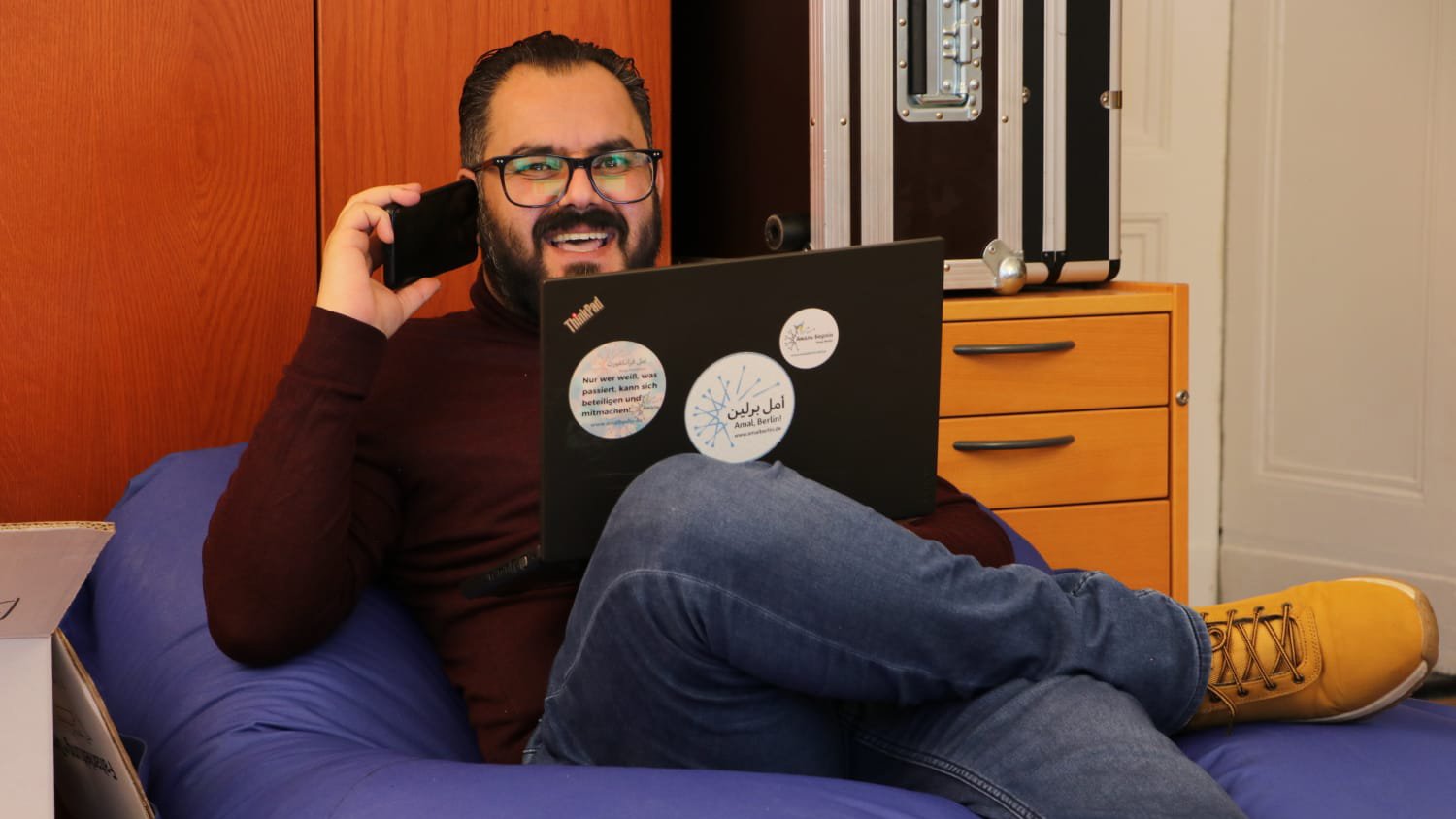“Listen more closely to us refugees!”
Khalid Al Aboud arrived in Berlin in 2014 after fleeing the Assad regime in Syria. Today, he works as a journalist, observing the public debate about integration from a personal and professional perspective.
I had already been in Germany for a few months when Angela Merkel said her now-famous words: “We can do this.” Back then, my German was still shaky – but I remember pausing and wondering: Who exactly is this “we” supposed to be? German society as a whole? The politicians? Or maybe even us, the people who had just arrived?
Personally, I think society – all those local initiatives, all the volunteers on the ground – really did do it. In the fall of 2015, when hundreds of thousands of refugees were arriving, I volunteered at an initial reception center in Berlin. I was overwhelmed by the kindness of the people. They donated everything: clothes, toys for the children – one man even brought his guitar. At that time, Berlin’s local tabloid BZ published a welcome letter from the mayor, Michael Müller – in Arabic, no less – along with practical tips for navigating daily life. As a journalist, I found that particularly moving.
But in the months and years that followed, that welcoming spirit slowly faded. Right-wing parties quickly began to stir up resentment. In 2016, the then AfD chair Frauke Petry suggested border guards should, if necessary, be allowed to shoot at refugees. In 2018, the then Interior Minister Horst Seehofer called migration “the mother of all political problems”. And in 2022, Friedrich Merz warned of “little pashas” in German primary schools. The vibe shift we’re seeing today didn’t come out of nowhere; it has a long history.
“Newspapers in Germany write day after day about the skilled labor shortage, while tens of thousands of highly qualified people with refugee backgrounds aren’t allowed to work in the professions they were trained for – as doctors or engineers, for example.”
I also believe integration policy could have been handled much better. In language courses, for example, hardly any attention was paid to the very different educational backgrounds of the participants – as if all refugees were the same. Nowadays, newspapers write day after day about the skilled labor shortage, while tens of thousands of highly qualified people with refugee backgrounds aren’t allowed to work in the professions they were trained for – as doctors or engineers, for example. That deeply frustrates me. And with all due gratitude to Germany, I have to say: German politics hasn’t really done it.
‘We can do this!’ – What remains of Angela Merkel’s famous words?
Overview with all the statementsThese reflections by Khalid Al Aboud are part of a series within our funding topic immigration society. In 2015, Angela Merkel famously said, “We can do this!” — referring to Germany’s response to the arrival of hundreds of thousands of refugees within just a few months. Ten years on, we have asked experts and partners from our projects: What progress has Germany made in terms of integration?
What I wish for is simple: that the German public, and especially the media, would really listen to us. Not just when it’s about language classes or getting a job. Not just when the so-called “refugee crisis” has another anniversary. We have things to say about public transport, about the housing crisis, about the minimum wage – about all the everyday issues that affect people in this country.
And I wish there were more recognition of the success stories – of everything we’ve managed to achieve over the past few years. We didn’t come here as takers – we came to contribute. We’re not here to threaten or disrupt German culture. We can enrich it. We don’t want welfare. We want to work – and in doing so, help secure the future of this country.
And if that were truly seen and understood, then yes, we really could do this. Together.
Khalid Al-Aboud works as a news editor for the platform “Amal Berlin” – and he is part of a team of exiled journalists who write for the German newspaper Der Tagesspiegel. We at the Robert Bosch Stiftung support this collaboration. As a result, several special editions of Der Tagesspiegel have been published, featuring voices from journalists from a wide range of countries. The most recent edition, “Heimaten” (Homelands), was released in August 2025. The articles are also available online, on the “Stimmen des Exils” (Voices of Exile) page – a special section of Der Tagesspiegel (in German).

